|
As I wrote this post, the Catholic University of America was preparing to celebrate Homecoming, when over 1,500 alumni and their guests returned to their alma mater. The weekend itself is a joyful occasion, a chance for classmates to catch up with one another and see what has occurred in the time since graduation. While life often takes alumni down different paths, Homecoming offers everyone the opportunity to reconnect with the place that, and the people who, helped launch the next chapter, whether it was one of service, religious vocation, family life, and/or employment. Homecoming itself reflects the willingness of the University to throw open its doors to welcome back all, no matter how long they’ve been gone or why they stayed away. It’s a tried-and-true model and it’s along these lines that the Church opens her doors to those who might have fallen away, whether because of a poor experience or because of a lack of interest or engagement. Initiatives such as “Catholics Come Home,” or the Archdiocese of Washington’s “The Light is On For You,” and similar diocesan programs nationwide, seek to welcome back Catholics who have been absent from the life of the Church. The projected tone and nature of these programs is of authentic openness and welcome — free of any judgement or bitterness. The goal is to encourage those who have been away to re-encounter the perfect love and understanding of our Lord as manifested and offered by His Church. The doors of the Catholic Church are open year-round for those seeking something better than what the world offers but there are moments in the liturgical calendar which emphasize and focus on refreshing one’s spiritual life such as Advent and Lent. Similarly, the invitation to participate in or observe the sacraments being celebrated can be an emotional catalyst for one to come back or renew his or her baptismal promise. Emotions, such as the awe of witnessing a reverent First Communion or religious profession, the joy of a marriage, or the hopeful rawness of a funeral, can move one to respond to a previously suppressed or unrecognized call to reconciliation with the Church. These “moments of return” can awaken a longing for an interior peace that only the Lord can provide. As Pope Francis encourages: Maybe someone … is thinking: my sin is so great, I am as far from God as the younger son in the parable [of the Prodigal Son], my unbelief is like that of Thomas; I don’t have the courage to go back, to believe that God can welcome me and that he is waiting for me, of all people. But God is indeed waiting for you; he asks of you only the courage to go to him… I have always pleaded, “Don’t be afraid; go to him; he is waiting for you; he will take care of everything.” We hear many offers from the world around us, but let us take up God’s offer instead: his is a caress of love. Archbishop Sheen, the great evangelizer who brought millions around the world into an encounter with the Lord via his weekly TV program, Life is Worth Living, encourages us to seek out those who have everything to gain by entering into Christ’s body on earth but are currently missing out: What was the first word of our Lord’s public life? That’s the key to preaching. It was ‘come.’ Come. Come to Me. Be enflamed with my Truth. Be on fire with my Love. And what was the last word of our Lord’s public life? It was ‘Go!’ First we come, then we go! (Sheen, “The Art of Preaching,” 1972) Just as the gift of faith was freely shared with each of us, how enthusiastically, then, we must go and share the Good News with everyone on the highways and byways — we cannot keep it to ourselves! As we begin to prepare for the celebration of our Lord’s birth during the Advent season in a few weeks, why not invite someone to join you for the beginning of a new liturgical year — and the beginning (or rediscovery) of something deep within that person that can only be the desire to know our Savior. By doing so, by planting the seed of the Word in people’s minds and hearts, by boldly meeting people where they are in life rather than waiting for them to come to us, each of us who are sharers in the Church’s ministry can cause much rejoicing in heaven (Luke 15:1-7). Let us embrace those who have been away for a long time, crying out, “Welcome home!”
0 Comments
Have you ever heard of St. Vincent Pallotti or Pallottine spirituality? If not, you are certainly not alone. Unfortunately, not many Catholics in North America have ever heard of St. Vincent Pallotti. As a lifelong Catholic, I myself was not introduced to St. Vincent and his spirituality until three years ago, which is unfortunate because Pallottine spirituality is a great gift to the Church. You may be wondering: what exactly is Pallottine spirituality and why is it important? While I could explain, I think our Holy Father does a much better job.
On October 10, 2016, during a private audience with members of the General Assembly of the Society of the Catholic Apostolate—the society of priests and brothers St. Vincent founded, Pope Francis stressed that, “in this Holy Year of Mercy, I like to remember that Vincent Pallotti was blessed to recognize that Jesus is the Apostle of the Father, rich in mercy and full of mercy. He is the one who fulfills its mission by revealing to everyone the tender love and the infinite mercy of the Father.” During the audience, Pope Francis also urged St. Vincent’s sons to continue their special mission to help Catholics “rediscover the immense love of God.” Pope Francis’ affirmation of the special mission of the Pallottines clearly demonstrates how necessary Pallottine spirituality is today. Additionally, our Holy Father also explained that one of the major aspects of Pallottine spirituality is rooted in a personal encounter with Christ’s infinite love and infinite mercy. The Holy Father said: “Your founder realized that in order to live in communion with God, Jesus Christ must be put at the center.” St. Vincent’s personal encounter with Jesus Christ’s infinite love and infinite mercy changed his life. It impelled him to action, to spread Christ’s love and mercy to everyone. St. Vincent spread Christ’s love by providing spiritual direction, spending hours in the confessional each week, promoting various Catholic devotions, and assisting all the baptized in coming to know their vocations to the apostolate. His encounter with Jesus Christ was truly at the center of his life. Like St. Vincent, a personal encounter with Christ can help us to revive our faith, rekindle charity, and assist all the baptized in understanding their vocations as apostles. Sounds pretty awesome right? I think so too. I will now explain three practical ways to infuse Pallottine spirituality into your ministry.
The need has never been so great; the task has never been so urgent. We all thirst to encounter God’s infinite love and infinite mercy. We all need St. Vincent Pallotti’s message and we can all work to spread it in our own ways. The question is—will you join us? For more resources on St. Vincent Pallotti and Pallottine spirituality, click here. Can you imagine yourself as one of the apostles? Put yourself in their shoes. You were moved by Jesus. His teachings spoke to your heart. When you were with him, you felt incredibly alive, free, loved and full of hope. No one persuaded you; you wanted to follow him. You were there when Jesus fed the 5,000, gave sight to the blind, and raised a young man from the dead. He received a royal welcome into Jerusalem. You celebrated Passover with him. You were also there when the soldiers came and dragged Jesus off to be crucified. Scared for your own life, you hid in the shadows abandoning him to death on the cross. You were a puddle of fear, sadness, anger, and despair. You disgust yourself. Disoriented, you stumble upon the others. You look to Peter but that rock is crushed, broken by grief and disbelief. The Sabbath comes and goes. It’s over—time to pick up the pieces of your life and move on. But just as you begin to leave, two female disciples arrive with astonishing news. Jesus is alive! Remember the mountain in Galilee? Remember what he said? Go there and you will see him. Of course, you go. You gather with the other disciples and make arrangements for the journey. It will take four days. Along the way, you cry, confess, and tell stories. You see the mountain in the distance. A lone person is descending from the top. Before you know it, Jesus is approaching you. You are gaping-mouth-open astonished. Some fall down to worship him. Others cannot believe it. Peter collapses to his knees. And still, Jesus approaches. He embraces you. You are alive again. Jesus reaches out to everyone. He turns to Peter last, lifting him up, restoring his strength. Jesus calls you together. "All power in heaven and on earth has been given to me. Go, therefore, and make disciples of all nations, baptizing them in the name of the Father, and of the Son, and of the Holy Spirit." He pauses here, letting his eyes meet each one of us. Some of us are giddy with joy, others cannot stop the tears. "Teaching them to observe all that I have commanded you." Suddenly, your heart begins to burn within you. You have a lot to say, a lot to share, a lot to tell. You remember with crystal clarity everything he taught, every moment he was with you, all the experiences you shared. You know now who you are and what you are about. It is time to go. But you hesitate. You want to stay. Jesus knows your heart. He is speaking again. Amazingly, he is talking to everyone and only you at the same time. "Behold, I am with you always, until the end of the age." Stay here. Stay with Jesus resting his eyes in yours. You have a lot to offer. You know who you are, what the Lord means to you, what he asks of you, and what he has given you. The stark truth of mission is hard to believe. God sends you into the world because there is something the world needs that only you can give. World Mission Sunday reminds us that we are sent to the whole world. As disciples of Jesus, there is no place or people beyond our sphere of concern. Pope Francis reminds us that mission is an "immense work of mercy, both spiritual and material." Last year, many of us “walked with Francis.” This year, let us be with Pope Francis in the mission of mercy. Let us renew our call to mission - to care about everyone, everywhere. I offer three suggestions on how to renew the call to mission:
Jesus is sending us out to all nations and he will be with us always. We will be astonished at how the Lord will reveal himself to us through mission. It is time to go. 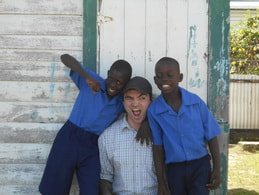 There is nothing easy about living in Guyana. Navigating the city streets of Georgetown is difficult, household chores need to be done more mindfully than in the United States, and even simple tasks like taking a shower or prepping to go to bed require more effort than I’m used to. Everything is just a little bit more difficult. Thankfully, as I’ve been adjusting to this new culture, country, and way of life over the past month and a half, I have had two saving graces that have kept everything in perspective. The first is my community of MVC volunteers who are experiencing the ups and downs of living in South America with me on a daily basis. The second is my job. No matter how difficult a single day may be, I’m always grateful to head to work. It serves as a constant reminder of why I’m in Guyana in the first place. I’ve been working for just over six weeks now at an orphanage for boys about fifteen minutes outside of the city of Georgetown in a small village called Plaisance. There are over fifty boys that live at the orphanage and about half of them attend the K-6 school on the grounds of the orphanage. Once the boys reach grade 7, they go to school at a secondary school in the next town over. I’ve been teaching the fifth grade class since my arrival and it has been…quite an experience. There are just a handful of boys in each grade. So, I spend my mornings and afternoons with three nine year olds and a thirteen year old who is repeating 5th grade for the second (or third?) time. They’re great kids, always keeping me on my toes. As the days have worn on, I’ve realized just how important the role I play in their lives is. Not to sound like a conceited fool, but the information that a fifth grade teacher dishes out to his/her students is essential stuff for life. For example, in the first few days of school, I’ve already taught the boys how to use quotations marks in Grammar class and how to do long division in Math class. When it comes to teaching vital lessons like these, I take the job very seriously. It’s fun to be able to teach something fundamental to little human beings, and it’s exhilarating to see them begin to understand it. On the flip side though, it’s slightly terrifying when you correct their homework and realize that they are still missing some of the basics. Alas, all part of the ups and downs of teaching. I’m learning really fast, I love being able to learn on the job. My classroom is a simple room with no walls between my room and the other classrooms in the school. All that separates each “classroom” from the next one over is a blackboard. I would have thought that it would take quite some time to get used to this way of teaching and learning, but I quickly grew used to staying focused on my classroom and the kids have been learning like this their whole lives, so they don’t even notice that there are five other lessons going on simultaneously with their lesson. The only time I have any issue with my four boys losing their focus is when the first graders are singing along with a cassette tape to an “Itsy Bitsy Spider” song that they all learned when they were in first grade. No matter how many times I try to coral them back into our lesson, they always feel the need to sing along with their six-year-old friends in the next classroom over. I have no materials to speak of to teach my students with, other than a few pieces of chalk and some outdated, tattered textbooks. Somehow though, it’s enough. Yes, it would be greatly beneficial to have a copier, pencils, crayons, notebooks or loose-leaf paper, but we make do with what we have. It takes a lot more creativity to teach a group of boys with nothing but chalk and my imagination than it would if I had a “Smart Board” and access to the Internet. I do find it humorous; however, that at the end of each day all four boys and I are always covered in chalk –our clothes, our faces, there’s no escaping it! At the end of each day I’m tired and I welcome the fact that Guyana’s close proximity to the equator means that the sun sets right around six o'clock each night. I think of it as the earth giving me permission to wind down and head to bed early. No matter the day, whether it’s Monday or Friday, I’m always exhausted by the time I’m arriving home. Thankfully, the tired feelings I experience are all just remnants of a good day’s work, in which I did a little teaching and, ironically, ended up learning so much more about life, love, and how the world works in the process. To learn more about Mercy Volunteer Corps, click here! Matthew Guiffre is a Mercy Volunteer Corps serving in Guyana South America. This post was originally written and posted on the Catholic Volunteer Network Blog. For more Catholic Volunteer Blog Posts please visit the CVN Blog Page. The Catholic Apostolate Center is proud to partner with the Catholic Volunteer Network by developing faith formation resources for volunteers and alumni, assisting in its efforts to provide and advocate for faith-based volunteerism and collaborate in many additional ways. “I extend my greetings to all the members of the Society of Catholic Apostolate and to all who share the charism of St. Vincent Pallotti. He has become an enlightening and inspiring beacon in the Church. His charism is a precious gift of the Holy Spirit, because it has given rise to and continues to call forth various forms of apostolic life and animates the faithful to actively engage in Gospel witness.” – Pope Francis (Audience with Members of the XXI General Assembly of the Society of the Catholic Apostolate, October 10, 2016) Today is the 5th Anniversary of the Catholic Apostolate Center. It is a ministry of the Immaculate Conception Province of the Society of the Catholic Apostolate (Pallottine Fathers and Brothers). The Center came into existence through the inspiration of the Holy Spirit and the discernment of the Pallottines in collaboration with many others. Last week, I sat in the Clementine Hall of the Apostolic Palace in Vatican City and listened to Pope Francis speak the words quoted above. The charism of St. Vincent Pallotti of reviving faith, rekindling charity, and forming apostles is what permeates all that the Catholic Apostolate Center does. Our mission is a simply a 21st century way of expressing this charism. The Center is responding to the call of Pope Francis to the Pallottines: “I encourage you to push forward along your path with joy and hope, committing yourselves with all your heart and with all your strength, so that the charism of your Founder bear abundant fruit also in our time. He loved to repeat that the call to the apostolate is not reserved to some, but is addressed to everyone… to operate with renewed vigor to reawaken faith and rekindle charity, especially among the most vulnerable segments of the population, the spiritually and materially poor.” On behalf of the Pallottines, the Board, Staff, Collaborators, and Advisors of the Catholic Apostolate Center, I offer thanks to all of those who collaborate with us, especially our affiliates, those who follow us on social media, utilize our resources, develop projects with us, and give generously in a variety of ways. Calling all to be co-responsible for the mission of Christ and his Church and to work apostolically in a collaborative way is a central element of the charism of St. Vincent Pallotti. We look forward to the years to come and plan to provide even more resources that will assist in the formation of “authentic apostles of Christ in the Church and in the world” (St. John Paul II). Please know that we at the Center are in prayerful remembrance of all those who are assisted by our ministry. May we be in prayerful solidarity with one another as Pope Francis is with us all. “I entrust all of you to the protection of Mary Most Holy, whom St. Vincent Pallotti venerated especially as Queen of the Apostles. Her good example of apostolic zeal and perfect charity, invites us to pray without ceasing to invoke the gifts of the Holy Spirit upon the apostles of today, so that the Gospel of her Son can be proclaimed in every part of the world.” May the Charity of Christ Urge Us On! In God, the Infinite Love, Fr. Frank
There’s a fear that’s crippling our call to discipleship today: The fear of failure. Let me just say, this is hard as Americans. We love success. We’re taught from a young age to dream it, pursue it, seize it. We value success stories; we want to have a greater impact, to change the world, to maximize results. If we can achieve this in our faith and ministry, even better, right? Well, maybe. This might be the message written into the American narrative, but it’s not necessarily the Gospel. Our assumptions start sounding odd alongside the Beatitudes Jesus gave his followers, and his promise to the disciples foretelling persecution and rejection (Mt 10:16-23). Moreover, St. Paul claimed to be “content with weaknesses, insults, hardships, persecutions, and constraints, for the sake of Christ” (2 Cor 12:10), and even instructed the Thessalonians, “to aspire to live a tranquil life, to mind your own affairs, and to work with your own hands” (1 Thess 4:11). St. Paul’s suggestions are not exactly the keynote themes we have come to expect at most high-energy church conferences these days. Not surprisingly, we are simultaneously inclined to relish the failure of others. As much as we love the success of a celebrity, we equally revel when the mighty fall. When this happens to church leaders, we assume they are fakes, phonies, or just not very gifted. What doesn’t easily capture our imagination is the struggle that happens in between — the daily living and dying to self that occupies the majority of time and energy in pastoral ministry. Resolving petty conflicts, preparing talks for kids who probably don’t care, assisting the odd homeless woman who keeps knocking at the door — if only we could eliminate these distractions and move on to the real work of the Gospel! Meanwhile, we eat up sensationalized stories of success and failure in an escape from what is real, and ultimately, redemptive. Success and failure actually have less to do with the size or location of a church than what values and expectations shape the content of our discipleship. When we inadvertently conflate American pragmatic principles for Gospel virtues, we risk making disciples who measure their faithfulness by a standard of fruitfulness foreign to the Gospel, thus creating a ministry model unhealthy for our souls and our churches. Failure is not fun or romantic. It’s not something to rejoice, or even proof of our faithfulness. But it prepares the ground for fruitfulness. Fruitful soil is rich with dead and decaying stuff — our failures — that ultimately make us ready to plant the seed of the Kingdom of God. Recovering a “theology of failure,” as Pope Francis and others have spoken of, may be an important step for renewing our Catholic imaginations and acquiring the heart of Jesus. In order to “ready this soil” there are a couple of things we can do to change the way we think about and approach our daily ministries. Ministry is a Process, not a Product When we measure a ministry’s effectiveness, we often desire quantifiable results steadily increasing along a straight line on a graph. There’s definitely a place for this kind of analysis in running a church or ministry. But doing God’s work often follows a slow progression passing through unanticipated hills and valleys. We look at a person’s life and say, “Here’s where Jenny lost her job and had to cut back time and money at church, but here’s where her small group members provided babysitting and cooked meals.” The Church and her members rise and fall by the logic of the death and resurrection of Jesus, not by the laws of the stock market. Seek Balance, not Efficiency When we elevate efficiency above balance, disciple making resembles an assembly line that aims to produce predictable outcomes in the shortest amount of time. One corrective measure we can take is to remember to keep holy the Sabbath. Is our ministry bringing us peace of soul, or are we burned out and burdened with too much stuff at church? It’s possible we need to pursue more effective systems or strategies, but maybe what we really need is to recover rest in God’s redeeming love. Share Stories of Redemption In the gospels, the opposite of failure isn’t success, but redemption. Pay more attention to stories of redemption than stories of outward success. I love the story of Blessed Charles de Foucauld, a 20th century monk and martyr who lived amongst the Tuareg people of the Sahara Desert, sharing in their daily joys and struggles while representing the love of Jesus. His story and spirituality inspired others, but only years after his death (see his Prayer of Abandonment). As part of our task for the New Evangelization, I suggest we revisit what we call success and failure and begin pursuing ends not so focused on winning in a religious market, but embodying the example set by our savior, Jesus Christ. In some way, I think we come closest to understanding our ministry in light of Christ’s death and resurrection, i.e., when we are in the valleys our world labels “failure.” In these valleys, we throw ourselves upon the power of the Resurrection, knowing we cannot rise again on our own. "This encouragement to holiness is renewed and takes on particular resonance – we love to repeat it – in this year of the Council, it highlights the note of holiness and apostolate of the church."
– Pope St. John XXIII, Homily during the canonization of St. Vincent Pallotti, Rome 1963 For a city that has seen the rise and fall of emperors, dictators, generals, politicians, popes, saints, and sinners over the millennia, it's hard to imagine that a humble priest from the peasant-filled mountains of Bergamo, Italy could make such a difference in the world. On a moonlit night in October 1962, Pope St. John XXIII stood on his balcony in Rome and addressed the people below: I hear your voices. Mine is only a single voice. But what resounds here is the voice of the whole world; here all the world is represented. One might even say that the moon rushed here this evening. Look at her high up there to behold the spectacle. This is how we close a great day of peace. Glory to God and peace to men of goodwill. (Discorso della Luna) And so began the Discorso della Luna, or “Moonlight Speech” by Pope St. John XXIII. Earlier that day, he opened the Second Vatican Council. Knowing he needed inspiration, this humble Bishop of Rome looked to another simple priest of Rome, St. Vincent Pallotti. A year later, Pope St. John XXIII declared Vincent Pallotti a saint. During the canonization, he called on the intercession of Saint Vincent Pallotti for himself, priests, laity, and the council and actually went to the body of St. Vincent Pallotti to pray before him. Before the election of St. John XXIII, popes rarely left the confines of the Vatican. Pope St. John XXIII himself made few official outside trips and only did so under great consideration. Because of this, one can only imagine the gravity of a visit from the Pope to pray before the body of St. Vincent. At St. Vincent Pallotti’s canonization, Pope St. John XXIII once again implored the crowd to follow this new saint’s example both in life and indeed. One month later, while visiting the Pontifical Major Roman Seminary (the seminary of the diocese of Rome) he also begged the students to follow St. Vincent Pallotti. The pope went as far as to call him his own "choicest guide". He called St. Vincent a wise custodian 'of pastoral spirit' and a source 'of teaching and encouragement for all times!' The spirit of Saint Vincent Pallotti can be seen throughout the Council and the work of the council. Pope St. John XXIII shared St. Vincent's vision that we are all called to holiness – that the universal call to holiness is open to the laity too, not just priests and bishops. He had a vision that Christ’s love needs to be accessible to all believers. Pope St. John XXIII demanded that the Church teach that Christ came for all! The concept of the universal call to holiness was written into multiple documents of the council, such as Lumen Gentium. Though Pope St. John XXIII did not live to see the completion of this important council, his spirit and the spirit of St. Vincent Pallotti helped to guide its direction. One of the key documents of the council was Apostolicam Actuositatem, or, the Decree on the Apostolate of the Laity. It emphasized the role of the laity within the Church: They should not cease to develop earnestly the qualities and talents bestowed on them in accord with these conditions of life, and they should make use of the gifts which they have received from the Holy Spirit ... They should also hold in high esteem professional skill, family and civic spirit, and the virtues relating to social customs, namely, honesty, justice, sincerity, kindness, and courage, without which no true Christian life can exist. The perfect example of this type of spiritual and apostolic life is the most Blessed Virgin Mary, Queen of Apostles. (Apostolicam Actuositatem) The title “Mary, Queen of Apostles” was one that was revived by St. Vincent Pallotti. This was an ancient title that had fallen out of use. During his ministry, St. Vincent Pallotti invoked this title to demonstrate that all were in the Upper Room, not just the twelve apostles. He had a portrait commissioned showing the number of woman and men at the moment of Pentecost. Like the symbolism behind the painting suggests, Apostolicam Actuositatem forever enshrined the notion that all people are called to be apostles of Christ. This document had two main writers: Fr. William Mohler, S.A.C. Rector General of the Pallottine Fathers and Brothers and the youngest bishop in attendance, Karol Wojtyla. Fr. Mohler and the future Pope St. John Paul II wrote into this document the shared vision of two humble priests John XXIII and Vincent Pallotti. We must follow these examples in our lives. Let us strive to bring the gospel to all, just as St. John XXIII and St. Vincent Pallotti did. A few Sundays ago, our parish priest mentioned a phrase in his homily that stuck with me for several days. He said, “The most important person in the world is the one who is in front of you right now.” I think this is a phrase St. Vincent de Paul would live by if he were among us today. St. Vincent de Paul is well known for his service to the lowliest members of society. He was a French Catholic priest who dedicated his priestly career to the community outreach and evangelization of the poor by founding the Congregation of the Mission. Through his example, St. Vincent de Paul teaches us to see Christ in the poor and suffering, helping us to live out Jesus’ calling, “Whatever you did for one of these least brothers of mine, you did for me” (Matthew 25:40). St. Vincent de Paul said, “The poor have much to teach you. You have much to learn from them.” As we speak and listen to the poor, we come to know God better and are humbled by the circumstances of others. By extending a helpful hand or lending an ear to the less fortunate, we show God’s love and acceptance of all. There are many ways we can demonstrate this love and acceptance. Consider one of the following:
This last point is an important one. Although we may not encounter the financially poor every day, we do face people daily who may be poor in their spirituality, relationships, knowledge, and other ways. By making an effort to lend a listening ear or helping hand to coworkers, friends, family, people in the grocery store, those walking to work or traveling on the subway in addition to the homeless begging on the streets, we can help to achieve the work of God on earth a little bit day by day. I recently came across a picture quote that read, “It’s worth the trouble to become the person you were meant to be.” I was instantly reminded that God has an individual plan for me, just as he does for everyone else. God utilizes us to do his good work in our communities, striving to serve both those who lack financial resources or are poor or dejected in spirit. St. Vincent de Paul said to his priests, “Do the good that presents itself to be done…God lets us know he wants of us. We belong to him and not to ourselves. If he increases our work, he adds to our strength.” We must be open to the good work God wants to accomplish through us. To do this, we must continue our daily prayer, pay attention to opportunities where God is calling us to serve, and keep an optimistic heart. St. Vincent de Paul, pray for us! Editor’s Note: In the well known Franciscan Peace Prayer, each line contains an invitation to let go of a particular stumbling block in order to receive the grace offered in its absence. For Franciscans and non-Franciscans alike, the Peace Prayer is often a source of comfort. It’s a prayer for the strength to become an “instrument of peace.” When looked at closer, the prayer is an invitation to let go. Each line presents an obstacle towards God and towards love. When we are full of doubt, it is harder to have faith. When we are weighed down by sadness, joy can seem like a distant and unattainable concept. However, at the same time, each line immediately reveals what is possible if we let go of these same obstacles. When we let go of hatred, we can sow love. If we let go of despair, then we can find hope. But how? Thankfully, the prayer shows us that too. Though poetic, it is appropriate that this set of words is recognized as a prayer, not a poem. The words acknowledge the difficulty of the proposition behind them. Let go of hatred. As we know, it’s not that easy. It’s not supposed to be. Alone, we couldn’t possibly let go of all of these things in order to find and promote peace. It’s no coincidence, then, that the very first word is “Lord.” Immediately, all the subsequent words are directed towards God. The next stanzas provide the “how” to the “what” question. In order to let go of these stumbling blocks, we have to let go of ourselves in a sense. We have to let go of the idea that we are the center of the universe and the idea that our own needs and desires are always of paramount importance. The second stanza is the “how.” We must recognize that there are in fact other humans in this world and they deserve as much attention and respect as we ourselves do. Therefore, we should never “so much seek to be consoled as to console.” The final stanza, then, is the “why.” What is the purpose of all this? In short – eternal life. Ultimate peace with God. We have to re-orient our gaze towards God. When we do this, our vision isn’t narrowed or restricted. In fact, it’s quite the opposite. When we re-focus, we see the world around us and the people in it. Pursuing eternal life with God doesn’t mean ignoring that there are other people in the world, denying the world around us, and spending all day every day in prayer. The people around us are our opportunities to grow closer to God while on earth. Through these interactions, we are filled. For, “it is in giving that we receive.” When we give of ourselves to others, we become filled. Lord, make me an instrument of Thy peace; Where there is hatred, let me sow love; Where there is injury, pardon; Where there is error, the truth; Where there is doubt, the faith; Where there is despair, hope; Where there is darkness, light; And where there is sadness, joy. O Divine Master, Grant that I may not so much seek To be consoled, as to console; To be understood, as to understand; To be loved as to love. For it is in giving that we receive; It is in pardoning that we are pardoned; And it is in dying that we are born to eternal life. Amen. Reflection Question: Which line of this prayer stands out to you? Why do you think that is? *This post was originally published on the Franciscan Mission Service blog on March 13, 2016 and has been reposted with permission.
|
Details
Archives
July 2024
Categories
All
|
About |
Media |
© COPYRIGHT 2024 | ALL RIGHTS RESERVED

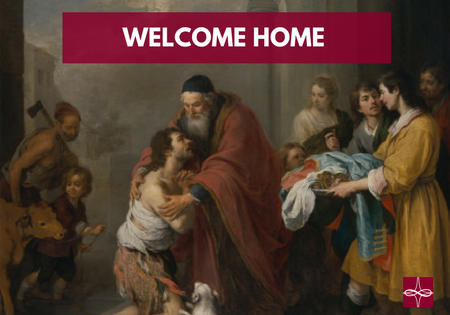

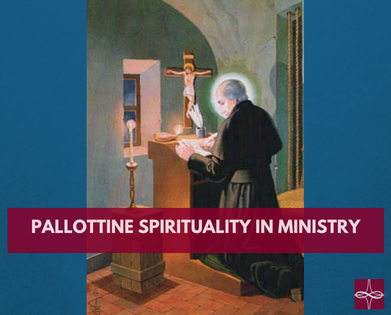




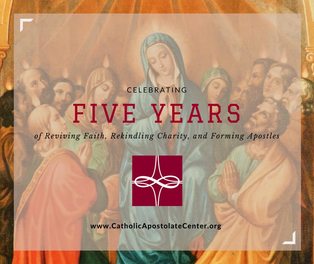
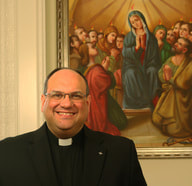
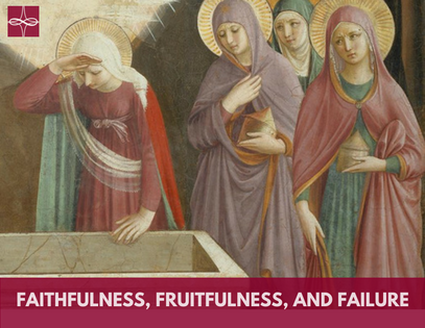



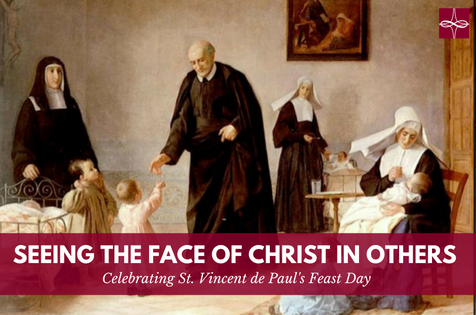



 RSS Feed
RSS Feed